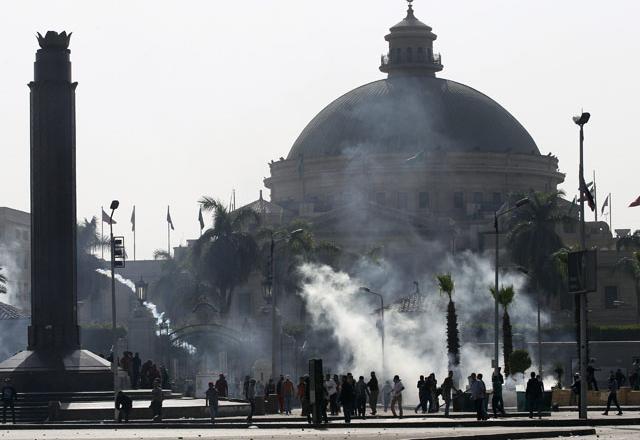You are here
Egypt military chief launches housing initiative
By AP - Mar 09,2014 - Last updated at Mar 09,2014
CAIRO — Egypt’s powerful military chief launched a $40 billion housing initiative Sunday to build a million homes in cooperation with a major Emirati construction firm, the first campaign-style move by Field Marshal Abdel-Fattah Al Sisi, who is widely expected to run for president.
Sisi hasn’t made an official announcement yet, but has strongly indicated he would run. The elections expected in April are the first since the military ousted elected Islamist President Mohamed Morsi in July following mass protests against him.
The housing initiative was announced Sunday on the official Facebook page of Egypt’s military spokesman. It said the million homes are dedicated to “Egypt’s youth” and are a first step to solve the country’s housing problem.
In a signing ceremony later aired on Egyptian television, the head of the military’s corps of engineers, Maj. Gen. Taher Abdullah Taha, said the initiative is one of the most important projects to solve the housing problems in Egypt and underlines the close cooperation and friendship between Egypt and the United Arab Emirates.
“It is a major project that strengthens brotherly relations and friendship” between the two countries, Taha told a gathering of military generals, the chairman of Arabtec, the Emirati firm, and housing experts. “This new cooperation is an addition to a flood of giving from the brotherly United Arab Emirates aimed at helping alleviate the suffering of the Egyptian people.”
Senior generals close to Sisi and government officials have told The Associated Press he has secured a large aid package from wealthy Gulf Arab nations and allies — Saudi Arabia, the United Arab Emirates and Kuwait — that would help keep the nation’s troubled economy afloat. The focus on alleviating economic woes and securing funds would help Sisi maintain his popularity while pushing on with painful economic reform, like lifting or restructuring the massive fuel and bread subsidies that account for nearly half of all government spending.
So far, those Gulf countries have poured $12 billion into Egypt in emergency packages since Morsi’s ouster.
At Sunday’s ceremony, a military official told the gathering the UAE promised Egypt three months’ worth of oil products, a move clearly aimed at easing the country’s energy crunch.
Hasan Abdulla Ismaik, Arabtec’s chairman, said Sisi has designated for free 13 different locations for the new project, targeting middle-income Egyptians. Arabtec in a statement said the project is valued at $40 billion and will be funded in the most part by a number of Egyptian and foreign banks. They plan for it to be developed over five years.
“We believe the Egyptian economy is poised for a significant rebound, particularly with the current government policies geared towards encouraging investment in the property development sector,” Ismaik said in a statement.
Pictures posted on the military spokesman’s Facebook page showed Sisi meeting with Ismaik, reviewing the project portfolio.
Since Egypt’s 2011 revolt, the powerful armed forces increasingly have taken on major infrastructure projects — an expansion of a role they have long played and which has helped them gain popularity.
Egypt has been roiled by ongoing protests largely from Morsi supporters. On Sunday, as students returned to schools and universities after their midyear break, limited protests took place outside a number of schools in Cairo. There were no clashes, but private broadcaster ONTV said students lobbed firebombs at its live feed car outside Cairo University and showed footage of the torched vehicle. The station said the blaze wounded two employees.
The protests have waned in the past months amid an intense crackdown from authorities that left thousands detained or facing trials. The midyear break had been extended by two weeks, apparently out of concern from authorities that students would boost the protest movement ahead of the election season.
Related Articles
Abdel-Fattah Al Sisi, the Egyptian military chief who last summer removed the elected Islamist president, announced Wednesday that he has resigned from the military and will run for president in elections scheduled for next month.
A $40 billion deal for Dubai firm Arabtec to build one million homes in Egypt may mark the start of politically-inspired Gulf investment in the country’s creaking infrastructure, from housing to transport, power generation and agriculture.
From a 59-storey tower in Abu Dhabi, the offices of Arabtec look out over the Gulf towards Middle Eastern and Asian nations where the construction firm hopes to expand. It is a symbol of the company’s ambitions — and the way in which they have run into hard reality.















